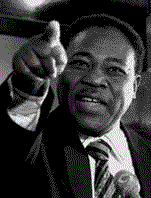World News
Sudanese
ambassador blasts
America's 'act of terrorism'
by Askia Muhammad
Washington Bureau Chief
 WASHINGTON-American
charges that chemical weapon components were being manufactured at a factory
bombed on Aug. 20 by U.S. Cruise missiles are "untrue, unsubstantiated,
indicative of a lack of understanding of my country, and a general ignorance
regarding Africa," Sudanese Ambassador Mahdi Ibrahim Mohamed told
reporters Sept. 2 at the National Press Club here.
WASHINGTON-American
charges that chemical weapon components were being manufactured at a factory
bombed on Aug. 20 by U.S. Cruise missiles are "untrue, unsubstantiated,
indicative of a lack of understanding of my country, and a general ignorance
regarding Africa," Sudanese Ambassador Mahdi Ibrahim Mohamed told
reporters Sept. 2 at the National Press Club here.
The bombing of his country demonstrated the U.S. "Wild West, shoot-first-boys-and-ask-questions-later philosophy," he said.
Ambassador Mohamed met at the State Department Sept. 1 with Assistant Secretary of State for African Affairs Susan Rice, telling her that his country was lodging a formal protest "over this unjustified military invasion of Sudanese sovereignty," and that his government was recalling its diplomatic delegation from Washington for consultation.
"It is difficult for my country to understand why the earth's greatest superpower would choose to conduct its affairs in such a condescending and heavy-handed manner," he said.
Recent statements by senior U.S. officials lend credence to some of Sudan's claims. Incomplete and inaccurate intelligence left senior officials unaware that El Shifa Pharmaceutical plant manufactured medicines, Defense Secretary William Cohen said Sept. 2 during a visit to Fort Drum in New York, according to a published report.
In addition, the purported financial connection between the plant and the alleged financier of a world-wide network of terrorists was, at best, "indirect," Mr. Cohen said, modifying his assertion at the time of the attack that Saudi expatriate Osama bin Laden "had contributed to this particular facility."
Sudan has cooperated with the United States on humanitarian and anti-terrorism measures for years, Mr. Mohamed said, pointing out that Sudan even permitted U.S. overflights of its territory in order to evacuate diplomatic personnel after the bombings of the U.S. embassies in Kenya and Tanzania.
In 1996, after requests by the U.S. and Saudi Arabian governments, Sudan expelled Mr. bin Laden as a suspected terrorist, and liquidated his financial holdings in their country. Sudan also found and captured-in cooperation with the CIA-the infamous terrorist "Carlos The Jackal," Mr. Mohamed said, and extradited him to France for trial.
For the past 18 months, he said, since the State Department accused his country of "a variety of unfounded and unsubstantiated human rights violations," Sudan has, on four occasions, invited the State Department's Committee on Religious Freedom to visit the country.
American officials, he said, could meet "wherever and with whomever they wished," to see firsthand the climate for religious freedoms in the country. In addition, he said, Sudan has invited the FBI, the State Department's Counter-Terrorism Committee and other U.S. officials to investigate any charges they're concerned with in Sudan.
Instead of responding to any of Sudan's offers of cooperation, Ambassador Mohamed said, the Clinton Administration "organized a strike team and sent Tomahawk missiles soaring into our capital, killing and maiming innocent civilians and destroying private property."
In the wake of the destruction of the El Shifa Pharmaceutical plant the Sudanese government has branded America's attack, "an act of terrorism."
The Sudanese government has also called for a United Nations investigation to confirm or refute the charges that the factory made chemical weapons, and Mr. Mohamed said, this week, before returning to Khartoum, he will meet with the Congressional leaders to request a Congressional fact-finding mission to come to Sudan.
In a recent interview, Minister Louis Farrakhan also called for the international community "to send a group of scientists ... to either declare America correct or declare her wrong." If proven wrong, the international community should "ask America to pay for the damage, rebuild the plant and pay the families who have been destroyed by America's arrogance," he said.
The U.S. government opposes Sudan's call for an investigation by the UN. So far, there has been no U.S. reaction to the call for Congress members to investigate the attack. "I don't have anything new (to report) on that," a Senior State Department press spokesperson said in response to an inquiry from The Final Call.
Assistant Secretary Rice told Ambassador Mohamed that America's attack was "not against the Sudanese people, and not against the Sudanese government, but against a facility where we had very credible evidence that this chemical (component of nerve gas) was being produced," an American official who attended the meeting said in a published report.
The Sudanese government's position, calling for a UN investigation, has been supported by a unanimous resolution by the 22-nation Arab League, and a similar resolution from the 51-nation Organization of African Unity (OAU).
"We are going to go around and around on that," the Senior State Department spokesperson said. "The Sudan and its supporters are now engaged in a public relations campaign to convince the world that the Shifa plant was not a legitimate target," the official who met with Ambassador Mohamed said.
[Photo: Sudanese Ambassador Mahdi Ibrahim Homamed gestures during press conference in Washington, D.C., Sept. 2 - World Wide Photos]
[ National News | World News | Features | Columns | Perspectives ]
